
I guess I'm just not used to watching a film that has such a strong level of artistic maturity, so when I saw "Manhattan," Woody Allen's black and white wonder, I was repeatedly overwhelmed by the precision and confidence of Allen and Gordon Willis, the cinematographer.
The film begins with shots of the city with a voice over by Isaac, a perfectionist and (although it's too easy to say, it's true) a neurotic, working on the first chapter of his book about a man living in New York. Then we move into a scene with four people in a restaurant, Issac and his 17 year old girlfriend Tracy, and Issac's friend and his wife, Yale and Emily. The composition in this scene really affected me. The camera shot over the shoulder of Yale and Emily, looking at Tracy and Issac, and I don't know why I feel that this composition makes this scene one of the best dinner table scenes I've ever watched.
Another scene of beauty is at Issac's apartment. The entire scene is one shot, far away from the actors and never moving. On the right, a staircase leads up to a higher floor that leaks light into the room below. On the left, Tracy is lit, sitting on the couch. There is a room slightly behind her and to the right that is lit, and another room lit further right. Despite all this light, there is much darkness in the room. It's not foreboding or haunting; no, the darkness is nonthreatening and subdued. As Issac talks to Tracy, I got the impression that the filmmakers wanted to keep some distance between the characters and the audience.
Later, Mary, Yale's lover, is introduced. Immediately, it is obvious that she and Issac have complete opposite personalities. She finds all the art he likes to be bullshit, and she finds Ingmar Bergman, Issac's revered director, less than appealing. What doesn't make sense is that two people who have nothing in common would want to have a relationship with one another. Does that happen in real life?
The most powerful scene in the film comes when Mary and Issac stumble into the planetarium after being chased by an electrical thunderstorm. This whole scene shows silhouette shots of the two walking, discussing esoteric topics. But at one point, the two stop rather close the camera, although their faces cannot be seen save the outlines. Here, Mary expresses interest in Issac, but he refuses. The expression is subtle, the rejection equally as subdued, but I found it to be the most emotional scene in the film.
The plot develops as Mary and Issac become involved after Mary breaks things off with Yale, but then she realizes that she still loves him and starts it up again. Issac is devastated and meets with Emily. What's strange to me is how calm she is about her husband cheating on her. She says that she thinks people in marriages should be allowed a few slip ups or freebies, to paraphrase. Tracy expressed the same ideology. It seems that everyone in the film thinks that way except Issac, who, for whatever reason, believes marriage should be a closed deal, no cheating, nada. Maybe he feels this way because he has had so many bad relationships (2 failed marriages) and he knows that even one slip up can mess up everything.
In the end, Issac realizes that he loves Tracy and races to go catch her in typical Hollywood movie fashion. He catches her just before she leaves for the airport (she planned on studying in London for 6 months). Issac tries to convince her to stay, but she won't. He says that he loves her, he remembers that with her, he had some of the most relaxed and enjoyable times in his life. But she, strangely, shows the maturity and says that 6 months isn't so long. And if they love each other, it won't be that bad.
I don't understand the 42 year old--17 year old scenario. Was Allen just trying to depict a relationship that hadn't been explored before? In the final scene, Issac says that "I don't want that thing I like about you to change." Tracy sympathetically resonds that "not everybody gets corrupted. You have to have a little faith in people." I feel that that is an optimistic outlook on humanity, if anything. For some reason, I think I've heard people talk about Allen and say that he has all these questions about love and life, but never any answers. I feel like this is at least one answer. That people may change, but not always in ways that really matter.
The whole film was an homage to films from the 30's, as made evident by the scenes of overly playful music without any dialogue (him and his son picking out a toy boat, Mary and Issac coming out of a theater and arguing about what they think, etc).
I loved this film. I think I loved it because it was so well made, because I forgot that the actors were acting and that I wasn't watching a documentary. Because the emotions on the screen felt real. I think that should be the aim of movies everywhere.
No comments:
Post a Comment